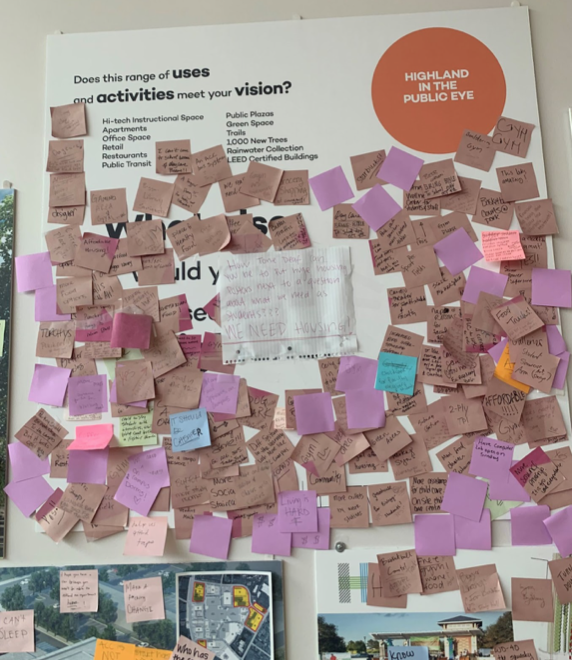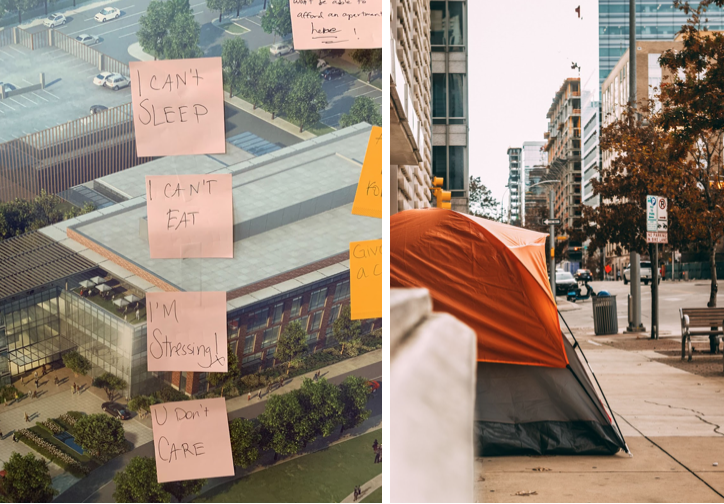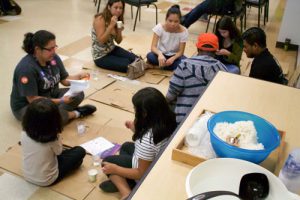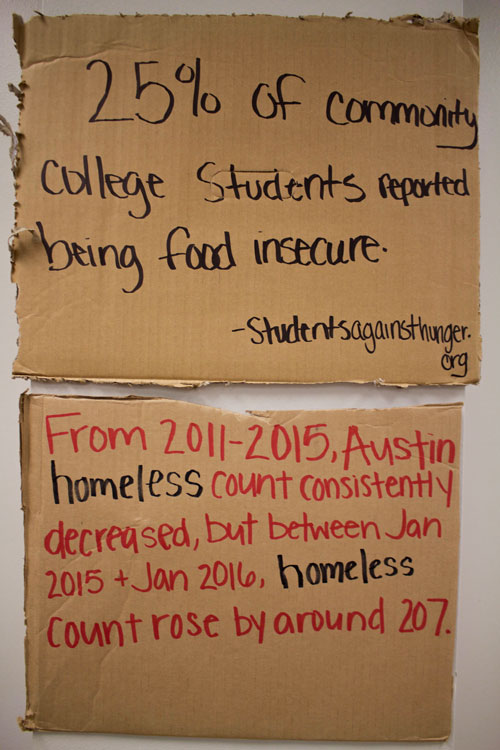“They want us to be like our mascot and sleep under bridges.” The administration’s lack of support enables housing insecurity to persist, student government members say.
by Daniel Sadjadi
Last August, ACC’s Student Government Association (SGA) members presented a recommendation proposal to the Board of Trustees to address the shortage of affordable housing for students.
The solutions included immediate steps such as creating a housing message board for students to connect with roommates, medium-term solutions such as creating a housing committee and increasing resources for affordable housing initiatives and programs, and long-term solutions such as working with the SGA and community partners to create more affordable housing options.
The SGA also surveyed ACC students on their financial and living conditions. They received 533 responses and found the following:
- 71% of students worry about paying rent
- 61% have faced housing insecurity
- 12% of students reported facing homelessness
- 30% of students spend more than 60% of their income on rent
- 31% report struggling to pay their bills after rent
- 20% have received rental assistance
- 80% say COVID-19 has drastically impacted their ability to work and pay rent
- 40% of students have been behind on rent
- 11.3% of students have faced eviction
- 7 current students surveyed were homeless
According to SGA Senator, Julia Cloudt, upon being presented with this information, ACC’s Board of Trustees asked SGA to return with more data on students’ housing situations. SGA members, who have already volunteered dozens of hours of unpaid time to gather data through surveys distributed in tabling events, classes, and through word of mouth, felt frustrated according to Cloudt.
The main issue for ACC students finding affordable housing is the lack of support from the administration, Cloudt said.
“We provided them with short, medium, and long-term solutions and there has been a lot of red tape with them not making it easy for us to even get solutions out to students,” she said. “I think one of the main issues is that we brought a lot of evidence to the administration and I think they see it as ‘it’s housing, it’s too big of an issue.’”
Some of the main solutions proposed by the student government included providing information on affordable housing within a ten-mile radius of each campus and creating an app to connect students looking for housing. However, the administration has not taken any significant actions to address this issue, leaving SGA to deal with it themselves, Cloudt said.
“We provided them with short, medium, and long-term solutions and there has been a lot of red tape with them not making it easy for us to even get solutions out to students”
Cloudt says that there is a misconception that students are looking for a huge solution to the housing issue, but they are only asking for help to help themselves. Cloudt also expressed that the lack of guidance and support provided by ACC to the Student Government is discouraging. Cloudt believes that the excuses given by ACC might be both legitimate and illegitimate, as there is data that ACC already knows that students are struggling with housing and even homelessness.
Rent in Austin has increased 93% since 2010 and the majority of students reported struggling to afford housing. Cloudt experienced housing insecurity herself during her senior year in high school and was forced to stay with friends after facing homelessness. She struggled to find work and save up to get her own apartment. Struggling to find housing and a job while homeless made a significant impact on her education as she was unable to attend school regularly during that time.
“I didn’t know where to go. I had no savings. I had no job. No support… I just had to stay with friends while I was looking into getting a job so I could save up and get my own apartment. That was like three or four weeks after me having to just go struggle by myself. I didn’t go to school that entire time. I had teachers reach out to me and call me because they were like, you haven’t been to class. I was using an old iPod Touch, so I didn’t even get the messages until after I was back home. I was real-life struggling. I almost slept at a bus stop one night, but I was so scared for my safety that I walked four miles to my friend’s house, it’s either that or maybe getting raped or assaulted.”
The lack of affordable housing affects students’ ability to focus on school and their overall well-being, as their basic needs are not being met. The transportation system is also a significant problem for people who do not have stable housing, as many are forced to rely on public transport, which takes away time and energy from their studies.
During a meeting with a trustee, they confirmed that the city fined ACC $1 million for not keeping apartments at Highland campus affordable, said Kay Trent, SGA’s president. At Highland, the Ella Parkside apartment building features 300 units but only 30 of which are reserved for affordable housing. A one-bedroom apartment would set you back $1,400 a month. “You need three or four times the rent to be able to sign off on it… my own teachers don’t make four times that amount. It was beyond affordable housing,” Cloudt said.
Frustrated by the lack of action, a group of SGA members organized a peaceful protest on campus by putting sticky notes onto advertisement posters for the Highland campus, containing quotes about the high cost of housing and living expenses. The sticky notes were taken down the next day but the group plans to continue protesting and keeping the pressure on the board to address the housing issue.

Trent said that ACC has the money to buy or build student housing, but is choosing not to. She suggested the closed ACC Pinnacle building could be used for student housing instead of converting it into a vineyard for the culinary department. Trent stated that ACC has displayed a lack of care for their students that is reflected in the budget, which is close to a billion dollars but not being used to build affordable housing.
At one of the Board’s meetings, the topic of the administration’s frivolous spending while ignoring basic issues came up. In 2019, ACC Chancellor Richard Rhodes received a 5% raise which brought his salary to $360,000. SGA members say this money should have been used for student housing instead. Trent also noted that the administration rejected a $20 living wage proposal for ACC employees.
Trent said that the investments made by the college are not always in the best interest of the students, like offering food services but making them prohibitively expensive to students, such as in the case of $9 ‘grab-and-go’ snack options at Highland.
Trent says that the college should invest more in resources that would benefit students, such as affordable housing for those without families and single mothers. Trent believes that providing a safe and stable housing environment for students would allow them to focus on their academics without being in “survival mode.”
Trent said that the city’s efforts to combat homelessness have not been effective and that the issue has only gotten worse without any permanent solutions. She stated that the city council needs to be more active and work together to find a solution, ‘as everyone is talking in circles about housing but nothing is actually being done to address the issue.’
“I just think that it’s selfish that a city can continue to go on this way. Or they try to push you out of the city, because the surrounding areas – Round Rock, Leander, Georgetown, all of that they still consider that to be Austin. But to live in Austin, you have to give up two legs and a half a year to afford it… Everybody’s sacrificing, like I sold my car because I was like, ‘Well, I can walk to school, I really don’t need a car per se,’ but also I couldn’t afford the gas, and insurance and gas are a big killer, especially if you’re already barely making rent.”
Providing a safe and stable housing environment for students would allow them to focus on their academics without being in “survival mode.”
For ACC students struggling with housing insecurity or looking for a place to live, the college has a student emergency aid program that gives out a maximum of $500 to help with temporary housing, but there is no one on staff to talk to for more permanent solutions.
Trent has been working since April to address the issue of students not having their housing and other basic needs met. She has been reaching out to different departments for help and working to build bridges between them. She believes the ball is in the Board of Trustees’ court to find a real solution.
“Nobody’s asking them to build an arcade, a gym, or anything. All those things would be lovely to have, but we just want housing right now… and so it’s just a lot of holding them accountable, a lot of physically going up to the Board of Trustees meetings, being in there, having interviews with people across the city. It’s a very challenging task, but it’s not impossible.”
She plans to continue the fight, even after she graduates from ACC, to hold the Board of Trustees accountable for not addressing the issue of housing. She is also looking to partner with other organizations to help find a solution.
SGA (Student Government Association) at Austin Community College is a group that helps students with various issues, including housing. They represent 72,000 students on campus. The best form of contact is to reach out to the ACC SGA email address listed below.
SGA tries to help students who are being redirected endlessly by other organizations on campus. SGA is a group of people who are tirelessly fighting for students and trying to help them. Change can only happen when people become involved, so the SGA encourages students to become involved and reach out to them. You can find more information and volunteer to get involved with SGA here.
Student Government Association Email: [email protected]





